Michelle Harrison: How she got published
14 July 2009
 I recently attended a talk by Michelle Harrison, author of The Thirteen Treasures
I recently attended a talk by Michelle Harrison, author of The Thirteen TreasuresIn The Thirteen Treasures
It was inspiring to hear about Michelle's journey to publication. We occasionally see stories in the press about authors who get a lucky break, but don't so often hear about those who persevere through countless rejections.
This is what Michelle's journey to publication looked like:
- Spent a year drafting
- Sent draft to publisher
- Three months later, received a rejection
- Sent book to six agents
- Five said no
- One said they liked it, but didn't want to represent it yet
- Michelle edited the book using their feedback, and sent it back
- They sent a longer reply, outlining bits they still didn't like
- Michelle edited it, and sent new versions back to the agent three or four times, incorporating new feedback, over a period of 18 months
- The agent turned it down
- Michelle took another look at the book herself, decided she didn't like one of the characters and rewrote to make the character stronger
- She spent "the longest time" on a cover letter to go with this submission, and then approached the top agent on her list, a name she had been too intimidated to approach before
- They asked to meet up and then quickly signed up to represent the book. It had taken four years to get to that point.
- The agent shopped the book around publishers
- A number of publishers rejected the book, with some requesting that the book be edited for a younger audience
- Simon and Schuster signed the book
During Michelle's journey to publication, there were many points at which she could have given up. Winning the Waterstone's prize is as much a testament to her perseverance as her imagination and talent for writing.
Labels: book review, books, publishing, writing
Book review: Brand New Day
18 June 2009
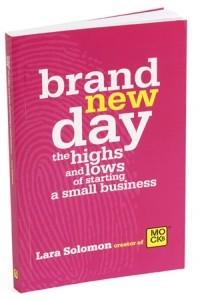 Business autobiographies are usually written by household name entrepreneurs, and marketed with the promise that you too can achieve riches beyond your wildest dreams. Most of the investors from Dragon's Den have spent some time on the bestseller lists and Richard Branson has three books to his name.
Business autobiographies are usually written by household name entrepreneurs, and marketed with the promise that you too can achieve riches beyond your wildest dreams. Most of the investors from Dragon's Den have spent some time on the bestseller lists and Richard Branson has three books to his name. These books are often inspiring, revealing how far you can go with the right mix of entrepreneurial flair, hard work, creativity and a little luck. But they're also written by people who started their businesses decades ago, and so tend to be light on the early history. The mental gulf between a millionaire and a reader who hasn't yet made the first sale is hard to cross.
With her book Brand New Day, Lara Solomon builds a bridge. The book is her diary from 2004 to 2007, and shows how she set up a new business from scratch. By the end of the book, the company has six staff and has turned over AU$250k (£120k) in three months. The book is inspiring, in part because the steps Lara takes are small steps anybody could take, if they were comfortable with the risk and had equal drive.
The product is a mobile phone sock, available in a wide range of designs, with a different one reproduced in the corner of each page (nice touch). To be honest, it's not a product I could believe in and not one I could see myself buying. But one thing that's made Lara's business a success is that she's persevered even when others didn't share her enthusiasm, and she's created a market in the process.
Key themes throughout the book are the challenges Lara has recruiting and retaining good staff, the emphasis placed on building the Mocks brand, and the extent to which Lara has to work outside her comfort zone to get things done. The book reads like an honest account of those first entrepreneurial steps, and provides a rare insight into what goes on in a smaller business. Laroo, the company behind the Mocks, is based in Australia so there are a few cultural references I didn't get, but most of the lessons are applicable internationally.
Lara's self published the book, so if you'd like to read a sample or order a copy, head over to the Brand New Day website.
For more small business advice, check out my book Small Business Websites That Work.
Labels: book review, books, business, customer service, publishing
London Book Fair review
30 April 2009
 Last week was the London Book Fair, attended by publishers, authors and Flanimals (pictured, right).
Last week was the London Book Fair, attended by publishers, authors and Flanimals (pictured, right).It was interesting to see how digital books were received at the fair. There was an area at the back of the hall given over to ebooks and digital publishing, and the seminars there were packed out. But it seemed to be led by the technology, rather than the content. There were plenty of firms who could help you to repurpose and distribute your content for mobile platforms (including the iPhone and Sony Reader), but I didn't notice anybody promoting digital content.
I didn't see any discussion about how ebooks can be different to print books. A certain amount of this is built into the device (eg searchability), but there is lots of potential to create new types of content based on the written word. Mindsportlive is developing iPhone apps based on its card packs, including '52 Ways to Beat Stress', but it was very much the exception.
It's partly the nature of shows like this that means major publishers would sideline their digital offerings. If you're negotiating rights, a printed book looks more impressive. Experienced publishers can get a measure of the content quickly. With ebooks, you can't tell how big they are, how well proofread they are in the middle, whether the book's consistently structured and so on without flicking through a lot of virtual pages. There's not a 'flick through until something catches my eye' button on any of the devices I've seen. Also, since the ebooks are often sold directly, they probably don't belong at a show that's partly about negotiating print book distribution and sales with intermediaries.
One company from Russia has an interesting proposition for interactive physical products - it markets hardback comic books for adults, with an enclosed music CD and CD-Rom. On the CD-Rom is a Flash animation that brings the comic book to life, and the CD contains atmospheric music that goes with the story. The project has been led by the music, with the creator being a musician first and commissioning illustration to expand on his work, which is an interesting way to create value at a time when it's increasingly difficult to sell music. For more information, check out the Ylotana website.
The Espresso Book Machine for printing on demand attracted a lot of attention. The Blackwell bookshop in Charing Cross Road will now be able to print books on demand using the machine, which was demonstrated at the fair. The device is a great way to increase effective footage in an expensive store, and it means many books need never go out of print. But it also transforms the bookseller into a book distributor. Surely the point of a bookshop is that you can browse and discover new titles you wouldn't have otherwise read? Isn't the idea that the bookshop can sell you books you didn't already know about? Print on demand is likely to require the shopper to ask for a specific book to be printed, although it is theoretically possible for displays to be mounted to showcase print-on-demand books, enabling infinite sales based on one shelf copy.
Other news from the show: Simon Pegg's writing a book for publication in October (hurrah!). It's an autobiography/memoir (err... okay). Enid Blyton is coming back from the dead with six new stories being ghostwritten in her (presumably trademarked) name. She wrote over 700 stories when she was alive, so you wouldn't think there would be a need for this. I wonder whether we'll see the day when John LennonTM releases a new album? Perhaps we have more respect for the personal creativity of songwriters than we do of book authors. Or perhaps it just needs another fifty years before The Beatles, Pink Floyd, Led Zepellin and Abba become brand names attached to ghostwritten work.
While at the show, I got some useful feedback on my novel University of Death from successful self-publishers, including Pauline Rowson, who writes and publishes crime fiction and business books. She has given me some great ideas for how I can make the book (or my next book) more marketable. Shows like this are always a good opportunity to pick up new ideas - I came back home with more ideas than I know what to do with.
Labels: book review, books, marketing, publishing, university of death, writing
University of Death reviewed in Metal Hammer magazine
30 August 2008
 The new issue of Metal Hammer magazine (dated September 2008) includes a review of my novel 'University of Death' on p91. The review says the book is:
The new issue of Metal Hammer magazine (dated September 2008) includes a review of my novel 'University of Death' on p91. The review says the book is:"A fun novel about the problems faced by musicians in making their mark on a music industry that's falling apart. A bitter satire that works its way up to a memorable finale."The full review makes reference to my non-fiction book 'Small Business Websites That Work' and says I'm letting my hair down here and having some fun. It's a comical observation in some ways, although there's no reason why someone shouldn't be an expert on website building and a passionate music fan. My press backgrounder for UoD mentions my non-fiction books as a way to establish my credibility as a published author. It's one way to differentiate myself from the many self-publishers out there, some of whom (whisper it now) aren't very readable.
For independent publishers, reviews are a valuable way of demonstrating credibility and publicising books, and I'm delighted to receive such a positive endorsement from Metal Hammer magazine. I'll be updating the book cover with this review quote. Although the book isn't available in the shops, each copy that's lying around in somebody's house or workplace is also an advert and good cover copy can help others to take an interest in the book and start reading.
The editor kindly published my website address with the review, although the exact URL published was unfortunately wrong. I've fixed it on the server so it redirects, but I'm also going to count the number of visits originating from that review, which will be an interesting experiment. It's difficult to attribute any sales or website traffic to particular coverage, but I do have an opportunity here to tie up the review with the resulting website visits (even if I can't follow that through to sales at the moment).
Labels: book review, books, publishing, university of death
Things I meant to blog about, but didn't have time
05 July 2008
| What I meant to blog about | What I would have said |
|---|---|
| Sticking Space Invaders to my wall | They look awesome, but it's very fiddly unfurling them if they stick to themselves. Get some but be careful. |
| Seeing David Gilmour and Ron Geesin perform Atom Heart Mother | The extended sections were great and the choir and brass sounded fantastic. It was a thrill to be one of just 900 to witness David Gilmour perform this for the first and probably only time during my own lifetime. |
| Seeing Roger Waters perform Dark Side of the Moon at the O2 | Great show, but odd since the star only plays bass on most of it. The solo stuff worked better in many cases. After trying to get a ticket for months and only being offered crap seats, I picked up a first class seat two days before the gig, through Ticketmaster. 'Sold out' gigs are never really sold out. |
| Ripping vinyl | Some great stuff has never been issued on CD, including a lot of Prince 12"s. Being able to move music between media like this and enjoy the sounds I paid for some years ago is a good argument against DRM. Use Audacity. |
| Ripping tapes | Having a tape deck fitted in to your PC is the next big thing. For former walkman fans like me, it's an easy way to digitise all those albums I bought on tape and haven't re-bought on CD yet, and all those home recordings I made. I won my tape deck in a joke competition. |
| Gardening | We've got an allotment now. It started off with knee-high grass all over it, but we're slowly reclaiming it. This year we're growing courgettes, sweetcorn, cabbages, and rhubarb there, and in the garden we have squash, tomatoes and herbs. Cats are evil. |
| The novel World War Z by Max Brooks | This account of the Zombie war is written as a series of interviews with survivors. While the lack of a central hero or recurring character means it jumps around a lot, it is a great way to convey the scale of a planet under siege. An engrossing story, and an interesting format for fiction. |
Labels: amstrad, book review, music, technology
Trust me on the semicolon
10 April 2007
 When I have time, I'll write a list of my favourite writing books and Roy Peter Clarke's Writing Tools will crown it. There are plenty of books for new writers, but this one helps writers with experience to develop their style. Some of the ideas are simple, but take on new life in this book thanks to the inspiring examples from journalism and fiction. Not all the writing is to my taste, but it's nearly all impressive.
When I have time, I'll write a list of my favourite writing books and Roy Peter Clarke's Writing Tools will crown it. There are plenty of books for new writers, but this one helps writers with experience to develop their style. Some of the ideas are simple, but take on new life in this book thanks to the inspiring examples from journalism and fiction. Not all the writing is to my taste, but it's nearly all impressive.Today, I discovered 'Writing Tools: The musical', based loosely on Baz Luhrmann's Sunscreen single of 1999 (download details on right of linked page, warning: lyrics spoilers in the main content).
It goes a bit wacky at the end and some clever ideas are skipped over in the interests of brevity. But as an aide-memoire for a much-loved book, and an example of how you can make a writing tutorial fun, I love it. It made me laugh a couple of times too, although that might be because I know both the book and the single it parodies. If you have any interest in writing, you owe it to yourself to gamble six minutes on it today.
Labels: book review, music, writing
Shaggy Blog Stories: Book for Comic Relief
17 March 2007
'Shaggy Blog Stories' is a book including the funniest posts from some of the best blogs in the UK. It was pulled together in a week by a team led by Mike at Troubled Diva, which is itself admirable, given he only took one day off work for the project in that time. Over half the cover price is going to Comic Relief. In the first 40 hours of being on sale, the book raised over £1234.
There have been books based on blogs before, but this one promises to be different because it's been created by a community (rather than a major publisher jumping on a popular blog), and it focuses on funny stuff. You can always scribble your comments in the margin.
It's published using Lulu, which is a print on demand company. That means your copy is lovingly printed when you order it and is then sent out to you. My copy's probably being queued up for printing now. Why not order one yourself?
Labels: book review
Book review: 'Freakonomics' by Steven Levitt & Stephen Dubner
11 October 2006
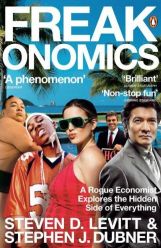 There are two themes running through 'Freakonomics'. The first is what a great bloke the co-author Steven Levitt is. Authors are expected to big themselves up on their book covers ('If Indiana Jones were an economist, he'd be Steven Levitt'), but it doesn't stop there. Words used to describe Levitt inside the book include 'the most brilliant young economist in America', someone who is 'so talented that [his work] doesn't need a unifying theme', 'a demigod, one of the most creative people in economics and maybe in all social science', 'a noetic butterfly no one has managed to pin down', and 'a master of the simple, clever solution'. This last one comes after six pages of introduction and two proper chapters, by which time it's too late to be pitching: we're either convinced he's worth reading because of his ideas, or we're not.
There are two themes running through 'Freakonomics'. The first is what a great bloke the co-author Steven Levitt is. Authors are expected to big themselves up on their book covers ('If Indiana Jones were an economist, he'd be Steven Levitt'), but it doesn't stop there. Words used to describe Levitt inside the book include 'the most brilliant young economist in America', someone who is 'so talented that [his work] doesn't need a unifying theme', 'a demigod, one of the most creative people in economics and maybe in all social science', 'a noetic butterfly no one has managed to pin down', and 'a master of the simple, clever solution'. This last one comes after six pages of introduction and two proper chapters, by which time it's too late to be pitching: we're either convinced he's worth reading because of his ideas, or we're not.And mostly, to be fair, we are. The second theme of the book is how the tools of economics and data processing can be used to test assumptions and explode myths about what motivates people. Along the way, Levitt answers questions such as why do so many drug dealers live with their mothers if dealing crack is supposed to be so lucrative? And do estate agents work in your best interests? He uses data to find teachers faking student exam marks and sumo wrestlers throwing a fight.
There are some surprising conclusions (although not about estate agents, needless to say). Prostitutes typically earn more than architects, he concludes, which is in part a reflection of the demand for their services: "Let's just say an architect is more likely to hire a prostitute than vice versa". Levitt demonstrates that US crime fell in the nineties mainly because of a pro-abortion law passed decades earlier, and that swimming pools pose a bigger threat to children than guns do.
Such ideas are fun to play with, but the book loses its way as it progresses. The concluding chapters are about what makes a perfect parent and what impact a baby's name might have on its life. Both get too bogged down in data to argue a convincing case.
Freakonomics has a lot of fascinating material and is recommended for anyone who enjoys a bit of a brain workout. Don't sweat the last two chapters, though. And don't write Levitt fan mail. It might go to his head.
Labels: book review, politics
Book review: 'As Used on the Famous Nelson Mandela' by Mark Thomas
09 October 2006
 What better way to expose the laxity of UK arms controls than for a bunch of schoolchildren to set themselves up as arms dealers? Without breaking the law, Mark Thomas and his team of students were able to trade weapons and torture instruments internationally. His book 'As used on the famous Nelson Mandela' is a damning expose of an industry worth about $1,900 million in exports to the UK - an industry that thrives on death and misery and is often subsidised by the tax payer. The villain in this story is British Aerospace, which Thomas concludes has exerted inappropriate influence on UK foreign policy.
What better way to expose the laxity of UK arms controls than for a bunch of schoolchildren to set themselves up as arms dealers? Without breaking the law, Mark Thomas and his team of students were able to trade weapons and torture instruments internationally. His book 'As used on the famous Nelson Mandela' is a damning expose of an industry worth about $1,900 million in exports to the UK - an industry that thrives on death and misery and is often subsidised by the tax payer. The villain in this story is British Aerospace, which Thomas concludes has exerted inappropriate influence on UK foreign policy. The tone of the book is well-measured: Thomas is able to hint at the dark side of the arms trade without setting up any voyeuristic sideshows. His approach is inherently comic, involving at times ridiculous stunts, but his talent for the one-liner (honed through years on the stand-up circuit) makes the heavy stuff engaging too. There's proper research behind this book and Thomas is both informed and well connected as an activist.
This book is an entertaining and thought-provoking read. If you've enjoyed Mark Thomas's live shows you'll hear his voice clearly as you turn the pages. If you're not familiar with his live work, start with his double CD recorded 'The night [Blair's Iraq] war broke out'. It's a perfect example of how to take a subject seriously while being imaginative and humourous in its presentation - a rare talent.
Labels: book review, comedy, politics
Book review: 'Who moved my Blackberry?' by (Martin Lukes and) Lucy Kellaway
10 September 2006
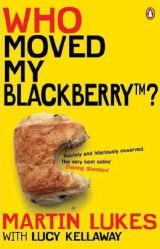 This book is a bit like having the munchies and over-indulging on cheesy wotsits. Each bite tastes great (although you hit diminishing returns after about half a bag), but when you've finished, you still feel kinda empty.
This book is a bit like having the munchies and over-indulging on cheesy wotsits. Each bite tastes great (although you hit diminishing returns after about half a bag), but when you've finished, you still feel kinda empty. That's because although there are some great jokes in this book (particularly in relation to branding), very little happens. As regards having a plot it's no more a proper novel than wotsits are proper food. Take a slice through the book at any page and the characters are pretty much in the same position, give or take a bit of office politics and lust. It doesn't help that the lead character is loathsome in every way. He's lazy, manipulative, sexist, self-important and selfish. We never seem to laugh with him - only at him, and darkly.
'Who moved my blackberry?' is a satire of office life, based on a column published in the FT bylined to the fictional Martin Lukes. The book unfolds through records of emails, which makes it quick and easy to read and creates some comic opportunities. Some seem a bit wasted (like when his Blackberry goes missing and someone impersonates him - that idea might have been a short story in its own right in other hands). The big joke is that we never see anyone doing any proper work, just producing 'initiatives' and playing politics.
For people who work in large corporations, a lot of this will probably ring uncomfortably true. If you get through chapter one and accept that the rest of the book is pretty much the same, it's an ideal book for you.
Labels: book review
Book review: At the Apple's Core by Denis O'Dell
31 August 2006
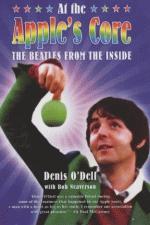 The thing that fascinates me about tower blocks is that you have so many unrelated lives neatly stacked. Through each window, you'll see somebody with different friends, dreams, work, problems and achievements. As you glimpse these lives, from a passing train for example, you get just a tiny taste of the scale and richness of human existence.
The thing that fascinates me about tower blocks is that you have so many unrelated lives neatly stacked. Through each window, you'll see somebody with different friends, dreams, work, problems and achievements. As you glimpse these lives, from a passing train for example, you get just a tiny taste of the scale and richness of human existence. Everybody has a unique story to tell. Even shared experiences like 9/11 and Live Aid affect people physically and emotionally in different ways. Sometimes a well-worn story can have some life injected into it by being reviewed from a new angle.
So we come to The Beatles, perhaps the most documented band in history. Their own autobiography extended to five DVDs and three double albums of out-takes. There is no shortage of unofficial accounts either.
The book 'At the Apple's Core' (first published 2002) reviews the Beatles experience from the point of view of Denis O'Dell, one of the directors of Apple and a producer of several of the Beatles films.
The making of films like Magical Mystery Tour and A Hard Day's Night naturally dominates the story, although there's also a lot about The Magic Christian (starring Ringo) and some aborted film projects. There are a few chatshow anecdotes, such as Paul buying a horse and the Beatles hiding their stash in film cans so they could be ordered from Abbey Road if needed. O'Dell comes across as a gentleman, unwilling to be too harsh to his former employers, but there are hints of how unreasonable they could be. Paul asks him to organise a wedding reception for Magic Alex at a few hours' notice, for example, so used to having things done that he is completely unaware of the work involved in doing them.
The book gives a few insights into how the Beatles lived. The rooftop concert is famous now, but O'Dell's take is partly that they were too afraid to hold the concert in public given the excesses of Beatlemania. Paul used to wear strikingly unfashionable clothes as a disguise so he could get about town without being mobbed too.
Much of this book's material is well known, particularly the Beatles' own story arc. There's not much fresh insight into the collapse of the Beatles or into their relationships with each other. But since this is written by someone who was actually there, it's a bit like spending a night in the pub with him reminiscing. With no disrespect intended towards O'Dell's talent, his was another relatively ordinary life touched by the Beatles. While none of us could have been in the band, many people could have been near them, and it's interesting to see what life might have been like if we had. This is not the most thorough Beatles book available, but by focusing on one man's experiences at Apple, it gives an interesting contribution to the Beatles library.
Labels: book review, music
Book review: Guitar Man by Will Hodgkinson
13 August 2006
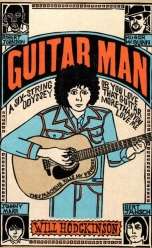 Plenty of people have picked up a guitar and learned to strum a few chords. Will Hodgkinson for no good reason decided that he would go far beyond this, and learn to play guitar well enough to perform his own concert within six months. Guitar Man is his story.
Plenty of people have picked up a guitar and learned to strum a few chords. Will Hodgkinson for no good reason decided that he would go far beyond this, and learn to play guitar well enough to perform his own concert within six months. Guitar Man is his story.Hodgkinson's day job is as a journalist, so we can't help wondering how much of his journey is engineered so he can write a book about it, particularly given the arbitrary nature of his goal (Why six months? Why now?). His research background shines through in the trivia about the social history of the guitar, but it felt at times like he was leaving too much out of the interviews he conducted with famous guitarists.
The best bits are when he manages to blag a guitar masterclass from the likes of Johnny Marr of The Smiths and Roger McGuinn of the Byrds. While we can share in Will's excitement at meeting his heroes and his progress as a guitarist, the book fails to pass on any of these lessons. I would have appreciated a more technical appendix that explained the killer techniques he picked up.
It didn't matter that I didn't know most of the music he writes about. Anyone who's ever loved a song will relate to and enjoy reading about his adventure. It's strictly one for hardcore music fans, though. If you've never played an instrument and never read an issue of MOJO, this probably isn't one for you.
Labels: book review, music
Book review: Past Mortem by Ben Elton
02 July 2006
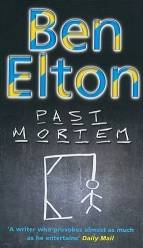 The idea of Ben Elton writing a book about Friends Reunited sounds like cash-in bandwagon-jumping of the worst kind. I thought it would be better if he wrote a book about one of the parody sites that people kept launching a few years back, such as Bullies Reunited.
The idea of Ben Elton writing a book about Friends Reunited sounds like cash-in bandwagon-jumping of the worst kind. I thought it would be better if he wrote a book about one of the parody sites that people kept launching a few years back, such as Bullies Reunited.So imagine my surprise to find out that's exactly what he's done. In his murder mystery 'Past Mortem', Elton explores the theme of bullying and the impact it has on everybody's lives: the bullies, the victims and the witnesses.
Detective Edward Newsom is tracking a serial killer while battling loneliness by delving into his own past through Friends Reunited. He's surprised to find his status has changed since he was at school, and then shocked as his past and present collide.
There are a couple of weaknesses. The main characters are well-written, but some of the characters on the periphery are see-through. Even if former class mates of the eighties did meet up, it's highly unlikely they would still be saying 'Rock on, Tommy!' to each other. Even in jest. The love story sub-plot is layered on pretty thick and only delivers a modest pay-off. While there are surprises throughout, the ending seemed obvious from about two-thirds of the way through.
But that's just picking on a good book. 'Past Mortem' elaborates on its theme creatively and brings everything to a tidy conclusion in a way that's so elegant it's like watching synchronised swimming. At times, it's gruesome. But it's satisfying to read and unlike Dead Famous, avoids easy answers and nearly all cliches. This is a great whodunnit, with a nice line in whydunnit thrown in for free. Recommended.
Labels: book review, comedy
Book review: A piano in the Pyrenees by Tony Hawks
21 June 2006
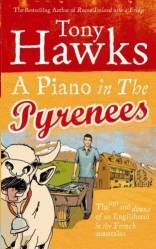 After lugging a fridge around Ireland, chasing Moldovan footballers to challenge them to play tennis, and increasingly desperate attempts to have a hit single, life's slowed down a bit for Tony Hawks. His latest book 'A Piano in the Pyrenees' tells the story of how he bought a nice holiday home in France, moved a piano over there and chilled out with his friends.
After lugging a fridge around Ireland, chasing Moldovan footballers to challenge them to play tennis, and increasingly desperate attempts to have a hit single, life's slowed down a bit for Tony Hawks. His latest book 'A Piano in the Pyrenees' tells the story of how he bought a nice holiday home in France, moved a piano over there and chilled out with his friends. He still has a flair for character sketches and for humorous writing. It's just that the material's a bit weak. There is a 15 page section about a village event where everyone follows the cows up into the mountains. It's a gruelling journey and a long day, but it all falls a bit flat when Hawks ducks out early and ends up committing a minor faux pas in front of the mayor: not really the kind of punchline you'd expect after such a big build-up.
Most of the book's pretty hum-drum: Buying houses abroad, wrangling with foreign bureaucracy, moving house, and building a swimming pool are common enough experiences that you'd never get an autobiography commissioned on the back of them. Reading the book is a gentle and pleasant enough journey - it just doesn't feel structured or particularly special at the end. Put it this way: you or I could never get this book commissioned on its outline, and probably not on the strength of any of these chapters either.
If you've lived in the region he writes about, it might be a lot funnier for you. If you enjoyed his other books, you'll probably like reading his style again. For me, it was an enjoyable but lazy read. After all his previous madcap stunts, I was pleased to read a book in which he seems to be content, rather than just jolly. But I'd be surprised if the market will be as tolerant and it seems unlikely this book will recapture the commercial success of his debut.
Labels: book review, comedy
Paper is so retro
01 June 2006
All the hip kids download their books nowadays. I've written some short reviews of ebooks I've read. I'll add to this page as I come across interesting new ebooks. So far, they're divided into fiction, non-fiction (general) and music. It's not the Dewey system, but it's a start.
I have also updated two pages in my section about promoting your music online today:
Labels: book review
Book review: Moondust by Andrew Smith
14 May 2006

Image courtesy NASA Johnson Space Center. Used by permission.
Only 24 people have ever left Earth orbit to see this sight with the naked eye. It's easy to overlook the significance of this: this is, after all, the most reproduced photograph in the world and from satellite photography we're all familiar with how the Earth looks from afar. But just imagine for a moment that you're so far away from home that you could see the whole planet at once. And that you are most likely one of only three living things that are not on that planet. And that you're bobbing and weaving through space in a tiny capsule with water and air to keep you alive in a hostile void that stretches eternally in every direction.
This photograph was taken on Apollo 17, the last of a series of missions that landed man on the moon. Nowadays our space missions don't even leave low Earth orbit. It seems unlikely we would be able to repeat the feat of visiting our nearest planetary neighbour today. The cost of the moon landings has been estimated at US$135 billion in 2005 terms and taxpayers are unlikely to bankroll such an expense today. We're also much more risk-averse than we were back then.
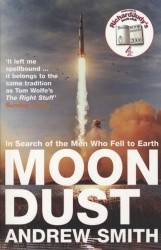 Of the 12 men who have been to the moon, only nine are still alive and they're all old. In his book 'Moondust', Andrew Smith sets out to meet the surviving moon walkers, aware that there will soon come a time when there are none left. He learns how they ate spaghetti, played golf, smuggled stamps and scratched initials on the moon. He learns how they thought their odds of returning alive were at best evens. And he tries to uncover how it feels to be part of such a lonely club - one of only 12 to have had the most out-of-this-world experience, and completely unable to answer a whole species' demands to know what it feels like.
Of the 12 men who have been to the moon, only nine are still alive and they're all old. In his book 'Moondust', Andrew Smith sets out to meet the surviving moon walkers, aware that there will soon come a time when there are none left. He learns how they ate spaghetti, played golf, smuggled stamps and scratched initials on the moon. He learns how they thought their odds of returning alive were at best evens. And he tries to uncover how it feels to be part of such a lonely club - one of only 12 to have had the most out-of-this-world experience, and completely unable to answer a whole species' demands to know what it feels like.To some extent, the book is a travelogue, talking about all the people Smith met and building up a picture of what the moon landings meant then, and what they mean today. He also writes about his own memories as a child of the landings on TV, and recreates the atmosphere and wonder of the time. Nobody knew for sure if there was life on the moon. Some thought the astronauts would return with a deadly disease that would wipe us all out. David Bowie was singing about being lost in space at a time when Apollo 11 was landing on the moon. At the height of the cold war, America put a man on the moon to beat the Russians but declared it a mission 'in peace for all mankind'.
The astronauts have doubtless been called upon daily to re-tell their stories in different places and much of the information in this book is available out there in some form. In his book, Andrew Smith re-assesses Apollo and asks whether it was worth it, hinting at what we might be losing over the next few years as our moon landers die out. As well as the impact on 'all mankind', he looks at the effect of the mission on the astronauts and their families and how the space programme treated its pioneers. There was no counselling available for astronauts after their return to help them answer the question 'what next?' and they were on a basic military wage, leaving many of them trying to carve out new careers after Apollo with mixed success.
By the time I was born, Apollo was over. The moon landings were history, and felt as remote and distant as World War II. I remember seeing the first shuttle launch on TV at school, but don't remember ever being taught about the moon landings. This book opened my eyes to what the NASA team achieved in three short years between 1969 and 1972 and the heroism of those who put their lives on the line to travel so far. It's funny to think that the whole thing came about as a result of a giant bet between the leaders of two superpowers, with little to show for it apart from a few photos, a few kilos of rock and a new sense of our place in the universe. But perhaps that alone is worth the trip. Neil Armstrong stood on the moon and found he could blot out the earth by holding his thumb up. "Did that make you feel big?" somebody asked him. "No," he replied. "Very small."
Labels: book review, technology
Book review: Dead Famous by Ben Elton
19 April 2006
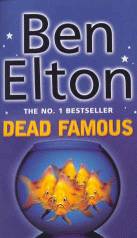 I'm a great fan of Ben Elton. His book 'This Other Eden' is one of my favourite fiction books of all time, although it obviously became a bestseller on the strength of his name rather than the accessibility of its story about eco-armageddon. So it's with a mixture of grudging admiration and disappointment that I read 'Dead Famous': Admiration because it's written to a perfect blockbuster formula - if you want a masterclass in producing a bestseller, there are worse places to start; but disappointment because his earlier books show he's capable of more ambitious writing and of creating more imaginative stories.
I'm a great fan of Ben Elton. His book 'This Other Eden' is one of my favourite fiction books of all time, although it obviously became a bestseller on the strength of his name rather than the accessibility of its story about eco-armageddon. So it's with a mixture of grudging admiration and disappointment that I read 'Dead Famous': Admiration because it's written to a perfect blockbuster formula - if you want a masterclass in producing a bestseller, there are worse places to start; but disappointment because his earlier books show he's capable of more ambitious writing and of creating more imaginative stories. The book is about a murder committed inside the Big Brother house, neatly fictionalised for this book. It's satire rather than comedy, so don't expect to chuckle much. The time zones jump around, and Elton's desire to withold the name of the victim for the first third of the book makes for some contrived writing. At times it feels padded. But it's a page-turner, easy to read, with some spot-on descriptions of the ghastly characters you see on shows like Big Brother. You get the feeling Elton churned this out pretty quickly, but as long as you read it pretty quickly too you'll be entertained if not impressed.
Labels: book review, comedy
Book review: The Mechanical Turk
02 April 2006
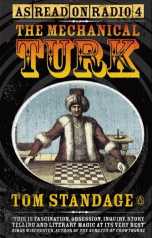 You might have heard of Amazon's Mechanical Turk. It's a web service that enables you to integrate human tasks with your software. So you might have a program that needs to know which of ten pictures is in focus, for example. You would write your program to feed that judgement task to Amazon's Mechanical Turk. Amazon then gets people to perform that task, pays them, and takes a commission on the payment from you. The data is returned to your software as if the task had been performed automatically. A neat idea, and it remains to be seen how it's used. So far, it's mainly Amazon using it for identifying photos of businesses for its own A9 search engine. It could be exploited by spammers to get around the intelligence tests used to prevent automated data entry (including tests such as working out the jumbled letters in an image). But it's not hard for Amazon to monitor at the moment, so this is unlikely to be a problem any time soon.
You might have heard of Amazon's Mechanical Turk. It's a web service that enables you to integrate human tasks with your software. So you might have a program that needs to know which of ten pictures is in focus, for example. You would write your program to feed that judgement task to Amazon's Mechanical Turk. Amazon then gets people to perform that task, pays them, and takes a commission on the payment from you. The data is returned to your software as if the task had been performed automatically. A neat idea, and it remains to be seen how it's used. So far, it's mainly Amazon using it for identifying photos of businesses for its own A9 search engine. It could be exploited by spammers to get around the intelligence tests used to prevent automated data entry (including tests such as working out the jumbled letters in an image). But it's not hard for Amazon to monitor at the moment, so this is unlikely to be a problem any time soon.Why is it called a Mechanical Turk? It's a reference to an automaton invented in the late 1700s to play chess. At the time, mechanised artworks were popular inventions. They might play instruments or animated landscape scenes. Wolfgang von Kempelen was a member of Empress Maria Theresa's court in Vienna. When he was challenged to produce an automaton better than any seen before, he created a machine capable of playing chess. Dressed as a Turk, the machine went on to play against - and mostly beat - members of the public. The Turk moved its own pieces and corrected an opponent's illegal moves. Kempelen proudly exhibited the cogs inside the cabinet at the start of the game, showing how the box was empty except for clockwork devices. For a long time, nobody came up with a conclusive explanation of how mechanics alone could simulate such intelligence.
In his book 'The Mechanical Turk', Tom Standage uses many contemporary accounts of the Turk to tell its story. He pieces together the machine's complete history, and ultimately reveals how the illusion was most likely created. It's not giving too much away to tell you that human intelligence was involved and it wasn't fully automated. That's why Amazon stole the device's name for its own service, where a fairly convoluted technical arrangement creates the appearance of machine intelligence.
At times the exhaustive research gets repetitive: reading accounts of the same event from different perspectives can be tiring. But these moments are few and far between. It's accessibly written, shows proper research and tells a story that's likely to delight anyone with an appreciation of illusion and/or technology.
I often read about software that performs such sophisticated functions that I question whether human intelligence is really being used. The developers of such applications are - like Kempelen - often unwilling to discuss how their product works even in the vaguest of terms. Given how cheap educated labour is on the global market, it wouldn't surprise me to discover that some enterprise-scale software applications that simulate human judgement owe more to the Turk than they're letting on. For the so-called developers of such software, this book would make an ideal gift.
With thanks to Patroclus for the recommendation and loan of the book.
Labels: book review, technology, webdesign
Book review: The Yes Man
19 March 2006
I've started reading books again on the tube, so I'm going to start reviewing them on here, partly as a reminder to myself of the books I've read. If you're watching The Apprentice, you can also see my review for Alan Sugar's book that accompanied series one.
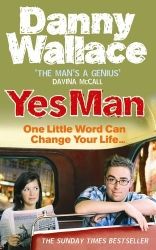 First up for a new review, then, is Danny Wallace's book 'The Yes Man', which I read at the turn of the year.
First up for a new review, then, is Danny Wallace's book 'The Yes Man', which I read at the turn of the year.We have Tony Hawks to blame or credit for books like this, depending on your viewpoint. Since he walked around Ireland with a fridge, there's been no shortage of people doing ker-azy things and then writing books about them.
Danny Wallace previously travelled the world with Dave Gorman, trying to meet other people called Dave Gorman. He also set up a cult in his book Join Me. For this book, 'The Yes Man', Wallace decided to agree to do whatever anyone asked of him. The best bits are when he says 'yes' to seeing his friends more, meets new people and challenges himself at work. The worst bit is where he pretends to believe that a 419 spam email is genuine and somebody really does want his help transferring money out of Africa. As he gets all excited and travels to Holland, you know he's doing stupid stuff just so he can write a book about it. These books work best when there's an element of silliness, but an air of sincerity too (as in Tony Hawks' first two books).
If you like the idea of 'The Yes Man', you'll enjoy reading it. The adventure draws you in, it's laugh-out-loud funny at times and Wallace has a talent for observation. He's mangled the truth enough to give it a proper story arc, so it doesn't get repetitive. And the ending is genuinely touching. If nothing else, the book will make you wonder how your own life would change if you said 'yes' more.
Labels: book review, comedy
